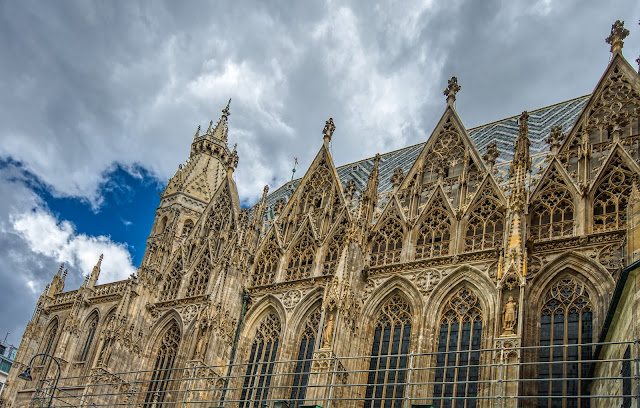After Dürnstein, we headed in to Vienna and juggled luggage, returned the rental car, and tackled the underground before settling in to our new AirBnB in a central area of Vienna called Innere Stadt.
Vienna is a big city of 2 million with many cultural gems.
"Vienna has been called the "City of Music" due to its musical legacy, as many famous classical musicians such as Beethoven, Brahms, Bruckner, Haydn, Mahler, Mozart, Schoenberg, Schubert, Johann Strauss I and Johann Strauss II lived and worked there. It played a pivotal role as a leading European music center, from the age of Viennese Classicism through the early part of the 20th century. Vienna was home to the world's first psychoanalyst, Sigmund Freud. The historic center of Vienna is rich in architectural ensembles, including Baroque palaces and gardens, and the late-19th-century Ringstraße, which is lined with grand buildings, monuments, and parks."
A short version would emphasise that Vienna was the capital of the Habsburg empire which existed between 1273 and 1918. More here. Much of the family's acquisitions were achieved by marriage; they weren't very good at war and frequently backed the losing side. The later stages of the Empire were dominated by the Emperor Franz Joseph I, who reigned from 1848 - 1916. He had an unhappy marriage to Sisi, who features prominently in Vienna.
We decided to target the following topics:
1) Sights and photography
2) Music
3) Psychoanalysis
4) Art
5) The Spanish Riding School
We engaged a guide, Roxane, who gave us an excellent start and showed us around the centre of the city and the RingStraße.
Stephansplatz
The impression we got was that it was a culture very much interested in aesthetics, much of it apparent in profuse ornamentation.
Donaunixen fountain
Shop window
Austrian Parliament Building
The Hofburg Palace
The Hofburg Palace
St Michael's Gate
Statues of Hercules
Vienna State Opera
Museum of Natural History
Art History Museum
The Maria Theresa Monument
A detail from the monument
Rainy day in Vienna
Music
We had prepared for the visit by listening to composers from Central Europe. See our preparation blog here. Composers from Central Europe
We also booked to attend a concert by the Mozart Orchestra in the Musikverein Golden Hall. A gorgeous setting with impressive acoustics.
This is the program we heard.
Musikverein Golden Hall
Psychoanalysis
See our preparation blog here. Psychoanalysis.We went on a tour with a woman Claudia Muchitsch, who had worked at the Freud Museum for many years. She was very interesting, although the tour featured a certain amount of walking outside and the weather was awful. Pouring rain and about 5˚ C.
The museum was a bit underwhelming; mostly empty rooms with photos to show where things would have been if they hadn't gone to London when Freud escaped from Nazi Vienna in 1938.
I was struck that the late nineteenth century was a time when the Habsburg Empire was at its peak, the walls of Vienna had been taken down, the exotic buildings of the RingStraße were being built, and the society was opening up to the rest of the world. Freud visited Charcot at the Salpêtrière Hospital in Paris and came back with ideas that were unacceptable to his conservative colleagues. Around the same time, Klimt travelled overseas and founded the Vienna Secession movement which was to some extent a reaction to the conservativeness in the world of art and architecture.
The Spanish Riding School
A common trivia question is 'Where is the Spanish Riding School?' It is, of course, in Vienna, Austria, and not in Spain. Spain was for a time part of the Habsburg Empire, and Spanish horses and riders were imported to the capital.
We attended a couple of events there: a practice session where horses and riders were being trained, and a guided tour around the stables and other facilities.
A performance of the Spanish Riding School
Two Lipizzaners practicing
A Lipizzaner leaving a panel of judges
Tour guide in the Winter Riding School
Two Lipizzaners in their stables
People from Vienna
- Alfred Adler (1870–1937), founder of individual psychology.
- Hans Asperger (1906–1980), pediatrician; discoverer of Asperger syndrome.
- Martin Buber (1878–1965), philosopher.
- Paul Feyerabend (1924–1994), philosopher.
- Viktor Frankl (1905–1997), neurologist and psychiatrist; founder of logotherapy.
- Archduke Franz Ferdinand of Austria (1863–1914), heir presumptive to the throne of Austria-Hungary.
- Franz Joseph I of Austria (1830-1916), Emperor of Austria.
- Sigmund Freud (1856–1939), neurologist; founder of the psychoanalytic school of psychology.
- Karl von Frisch (1886–1982), animal psychologist, beekeeper and zoologist; co-recipient 1973 Nobel Prize in Physiology or Medicine.
- Friedrich Hayek (1899–1992), economist; co-recipient of the 1974 Nobel Memorial Prize in Economic Sciences. Article.
- Theodor Herzl (1860–1904), journalist; founder of modern political Zionism.
- Friedensreich Hundertwasser (1928–2000), architect and painter.
- Melanie Klein. (1882 –1960) psychoanalyst.
- Karl Kraus (1874–1936), satirist; publisher of the newspaper Die Fackel.
- Niki Lauda (1949–2019), entrepreneur and race car driver.
- Konrad Lorenz (1903–1989), behavioural scientist; co-recipient of the 1973 Nobel Prize in Physiology or Medicine.
- Franz Mesmer (1734 – 1815)
- Karl Polanyi (1886–1964), economic historian.
- Karl Popper (1902–1994), philosopher.
- Arnold Schoenberg (1874–1951), composer, music theorist and painter.
- Erwin Schrödinger (1887–1961), physicist; co-recipient of the 1933 Nobel Prize in Physics.
- Franz Schubert (1797–1828), composer.
- Johann Strauss II (1825–1899), composer.
- Josef Strauss (1827–1870), composer.
- Ludwig Wittgenstein (1889–1951), philosopher.
- Stefan Zweig (1881–1942), writer.
- Theodor W. Adorno (1903 –1969) philosopher, musicologist, and social theorist.








































No comments:
Post a Comment